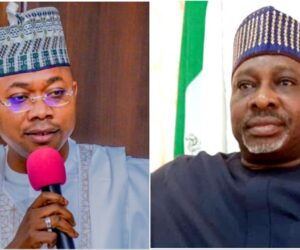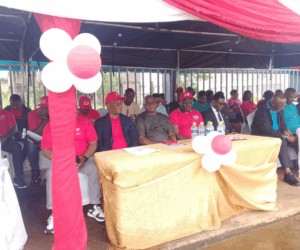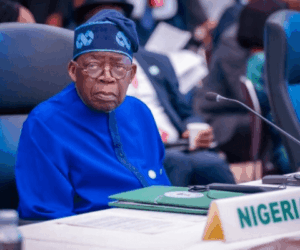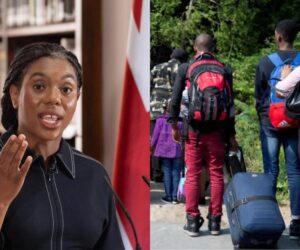Last week, US Senator Ted Cruz introduced a bill aimed at sanctioning the Nigerian government for allegedly supporting terrorism aimed at eliminating the country’s Christian population.
Mr Cruz, a Republican, claimed that extremist groups have been going house to house, hunting down Christians for decades, killing wives, children, and Catholic priests in an attempt to rid the country of Christians.
He accused the Nigerian federal government of facilitating this anti-Christian crusade. His bill, titled “Nigeria Religious Freedom Accountability Act of 2025,” seeks a US sanction on the country.
Also, in an episode of his Verdict with Ted Cruz podcast, the Texas senator said his legislation would put real consequences on the Nigerian government for facilitating the “persecution of Christians.”
Other top American politicians and political commentators have expressed similar views.
A member of the US House of Representatives, Riley Moore, tagged Nigeria the deadliest country in the world for Christians.
Mr Moore, also a Republican, in a post on X, disclosed that he had written to Secretary of State Marco Rubio, demanding that the US use every diplomatic tool to stop what he described as the “slaughter of Christians.”
This includes designating Nigeria as a country of Particular Concern (CPC) and suspending arms sales and technical support to the government.
“Muslim extremist groups such as ISIS-West Africa, Ansaru, and Boko Haram are major perpetrators. Just last week, Boko Haram ravaged Kirawa, Nigeria, displacing thousands.
“But just as concerning are reports that corrupt cells of the Nigerian government may be complicit,” a part of his letter read.
Similarly, Patrick Bet-David, a satirist and political commentator, said more Christians are killed in Nigeria than in the rest of the world combined.
Bill Maher, a popular American comedian and political commentator, compared the violent attacks on Palestinians in Gaza to the security crisis in Nigeria.
Mr Maher, who votes for the Democratic Party, claimed that there was “so much more of a genocide attempt than what is going on in Gaza.
“They are literally attempting to wipe out the Christian population of an entire country. I’m not a Christian, but they are systematically killing the Christians in Nigeria.”
These claims, however, are inaccurate.
Moreso, they reductively compress Nigeria’s complex security challenges into a false singular narrative that distorts the reality of the situation.
Conflict experts and researchers also identified that these claims are likely to stoke more violence in an already fragile system.
Nigeria faces different forms of insecurity with various armed groups operating in different parts of the country. The groups, with different motives, kill and displace thousands of people across the country.
Jihadist groups in North-east
Armed violence in Nigeria manifests in different but overlapping forms, driven by a mix of historical grievances, ethnic tensions, economic disparities, religious extremism, climate change, and weak governance.
A single narrative cannot accurately capture this situation.
While the North-east region faces insurgent attacks from Boko Haram and other Jihadi groups who seek to eradicate Western education and civilisation, the North-west struggles with armed banditry.
The North-central region deals with frequent communal clashes and farmer-herder conflicts, the South-east faces agitations by separatists, and the South-south battles with militancy.
None of the major sects has solely targeted Christians as part of an organised, systematic effort to eliminate them, as Mr Cruz and other Americans have claimed.
Boko Haram, since it morphed into a violent jihadist group in 2009, has killed hundreds of Christians and attacked Christian sites. But the ideologically motivated terrorist organisation, alongside other sects operating in the North-east, like ISWAP, has also attacked mosques and Muslims, with the majority of the victims in the region believed to be Muslims.
Terrorists in the region attacked a church in Pemi, a predominantly Christian community in Borno State, in 2020.
In 2017, at least 50 people were killed when a bomb was detonated in a mosque in the Unguwar Shuwa area of Mubi, Adamawa State.
Also in 2018, a double suicide bombing in another mosque in Adamawa led to the death of 86 people.
The ideologically driven Jihadist groups have attacked clerics, carried out abductions, and raided communities irrespective of religious faith.
In April, a bomb detonated on the road connecting Rann and Gamboru communities in Borno, killing 26 people. A month later, militants attacked two villages in the state, leaving at least 57 people dead and at least 70 missing.
Last month, Boko Haram carried out a series of attacks across 10 communities in Borno, including the attack on Darajamal village, which led to the death of over 60 residents.
According to a report by Agora Policy, ISWAP, an offshoot of Boko Haram, has carried out approximately 1,480 attacks in Nigeria, resulting in about 15,111 deaths.
Similarly, a 2024 report by the Africa Centre for Strategic Studies attributes 3,627 fatalities to ISWAP-related violence in that year alone.
ACLED, in a report published in 2022, identified that the overall picture of political violence in Nigeria shows that Christians are not the primary or most frequent targets.
It stated that while anti-Christian violence exists, it represents a small portion of the broader violence.
Of all the incidents of political violence that target civilians, it noted, only 5 per cent are clearly identified as targeting Christians for their faith.
Armed banditry non-ideological
The major driver of the violence in the North-west is armed banditry. This wave of insecurity is most intense in Zamfara, Katsina, Sokoto, Kaduna, and Kebbi.
While the majority of the bandits are ethnic Fulani and of Islamic faith, they are not representative of the community and are non-ideological. Also, like the majority of the attackers, the majority of the victims are Muslims.
The bandits are motivated by profit, revenge, and survival, rather than religion or political ideology.
The International Organisation for Migration (IOM) describes the crisis in this region as “multidimensional.”
It is a conflict that includes attacks by criminal groups on local populations; kidnapping, grand larceny along major highways, and cross-border crimes. The IOM estimates that the number of people displaced from this region exceeds 1.3 million.
Malik Samuel, a conflict researcher with Good Governance Africa (GGA), said people of the Islamic faith constitute the majority of victims affected by the violence perpetrated by jihadists and armed bandits in the north.
Mr Samuel noted that the US senator, with his false claims, is only “fanning the embers of hatred and religious sentiments.”
Two weeks ago, amidst the claim of a “Christian genocide”, a bandit group attacked a mosque in Zamfara, killing five worshippers and abducting several others.
In August, gunmen opened fire on a mosque in Katsina, killing more than 27 people, a few days after an attack on a Catholic Church. The same month, a group of worshippers was abducted from a mosque in Sokoto.
According to the Council on Foreign Relations’ Nigeria Security Tracker, bandit groups carried out about 77 attacks on both churches and mosques in 2022, leading to 289 deaths.
However, most bandit attacks are targeted at farmers and farming communities rather than religious bodies or sites.
Within the last two years, insecurity in this region has caused about 2,456 deaths and 7,260 abductions.
Armed bandits have also abducted students. One such case was the abduction of 137 students from elementary schools in Kuriga, Chikun LGA, Kaduna State, who were later released after a ransom was paid. There’s also the abduction of about 300 school girls from a raid on a boarding school in Jengebe, Zamfara.
Tension in North-central
When describing the mischaracterisation of the tension in the Middle Belt, the Institute of Security Studies (ISS) stated that the poor framing of the violence in the region led to a misdiagnosis and an escalation of conflict rather than solutions.
“What is happening there is not terrorism, as it lacks an ideological underpinning,” it notes. “It goes beyond climate change explanations and religious or farmer-herder conflicts.”
“Instead, it is protracted criminality that is intentional and coordinated, and should be treated as such,” it further noted.
The conflict does carry a religious undertone due to the tension between some Christian and Muslim communities, particularly in states like Plateau. However, the central driver of the tension remains competition over scarce resources, according to IOM.
In April, armed groups killed at least 52 people and displaced nearly 2,000 residents over several days of attacks in Plateau State.
An attack on Yelwata village in Benue resulted in the death of over 200 people in June.
One major driver of the conflict in the North-central is the control over land and grazing rights. Between 2020 and 2024, there were 2,347 deaths in 359 violent clashes between farmers and herders in Nigeria’s north-central and north-west regions, according to Nextier, an organisation focused on addressing developmental issues.
In 2024 alone, Nigeria recorded 467 deaths in 61 such incidents. The North-central was the most affected, with 416 deaths.
According to the authorities, the farmer-herder crisis has so far led to the death of over 60,000 people in the region.
South-east Separatism
Meanwhile, the South-east crisis is linked to long-standing separatist movements that trace back to the Nigerian Civil War, when the Igbos sought to have a separate country.
Although the civil war ended with promises of full integration by the Nigerian government, many residents of the South-east still seek to have an independent Biafran state.
This has led to a quasi-armed rebellion by the Independent Peoples of Biafra (IPOB), whose leader, Nnamdi Kanu, is in prison, where he is on trial for treason.
IPOB and its armed wing, ESN, have been blamed for attacks in the region that have caused the deaths of hundreds of people.
Over the past two years, at least 536 people have been killed and 390 abducted, according to official estimates. The majority of Igbos predominantly identify as Christians, and the same is believed for IPOB, although Mr Kanu has described himself as a Jew. The attacks, however, target both public and private institutions and individuals, with security officials and facilities being deliberately targeted.
South-south militants
In the South-south, militant attacks and waterway abductions remain common. Within the last two years, about 458 people were killed and 811 abducted. The attacks are rooted in agitations for resource control by residents of the oil-producing Niger Delta, many of whom are impoverished despite the communities being the goose that lays Nigeria’s golden egg. The attacks have, however, morphed into full-grown criminality, especially after the Nigerian government implemented an amnesty programme that ensures that militants are paid and also trained in different professions to abandon the armed struggle. The amnesty programme is still in place and costs Nigeria billions of naira every year.
Govt denies allegation
Although there have been some claims of Christian genocide in Nigeria in the past, the claims gained traction in the past fortnight when the aforementioned influential American politicians and political commentators regurgitated them.
The recent claims led the Nigerian government to have to debunk them.
In a statement, the presidency described the allegations as a gross misrepresentation of reality.
It also declared that the allegations were false, baseless, despicable, and divisive.
READ ALSO: Alleged Christian Genocide: Nigerian lawmakers to send delegation to US Congress
“While Nigeria, like many countries, has faced security challenges, including acts of terrorism perpetrated by criminals, couching the situation as a deliberate, systematic attack on Christians is inaccurate and harmful.
“It oversimplifies a complex, security environment and plays into the hands of terrorists and criminals who seek to divide Nigerians along religious or ethnic lines. Muslims, Christians, and even those who do not identify with any religion have suffered at their hands,” it said.
The Special Adviser to President Bola Tinubu on Information and Strategy, Bayo Onanuga, called Mr Cruz’s statement malicious and misleading.
“The bandits in the North West kill worshippers in their mosques. Christians are not targeted. We have religious harmony in our country. Stop these malicious lies,” he said.
In his reaction, the Special Adviser to President Bola Tinubu on Policy Communication, Daniel Bwala, said Americans making the “Christian genocide” allegations were pushing “western media propaganda.”
However, Babafemi Badejo, a foreign policy analyst, said Nigeria must put an end to the violence across the country and stop the murder of citizens if it is opposed to the mischaracterisation of the conflict by foreigners.
The professor of Political Science and International Relations said, “The Nigerian government should do the needful. Stop the slaughter of Nigerians.”
“If the Nigerian government is incapable of stopping unnecessary killings of Nigerians, it should seek international help under the Responsibility to Protect (R2P).
“Neither Christians nor Muslims deserved to be killed by cattle herders and other militias, either for separatism, land grabbing, latent Hausa/Fulani differences dating back to the very early 19th century, or other inter and intra religious differences,” he added.








